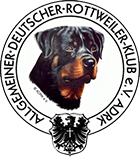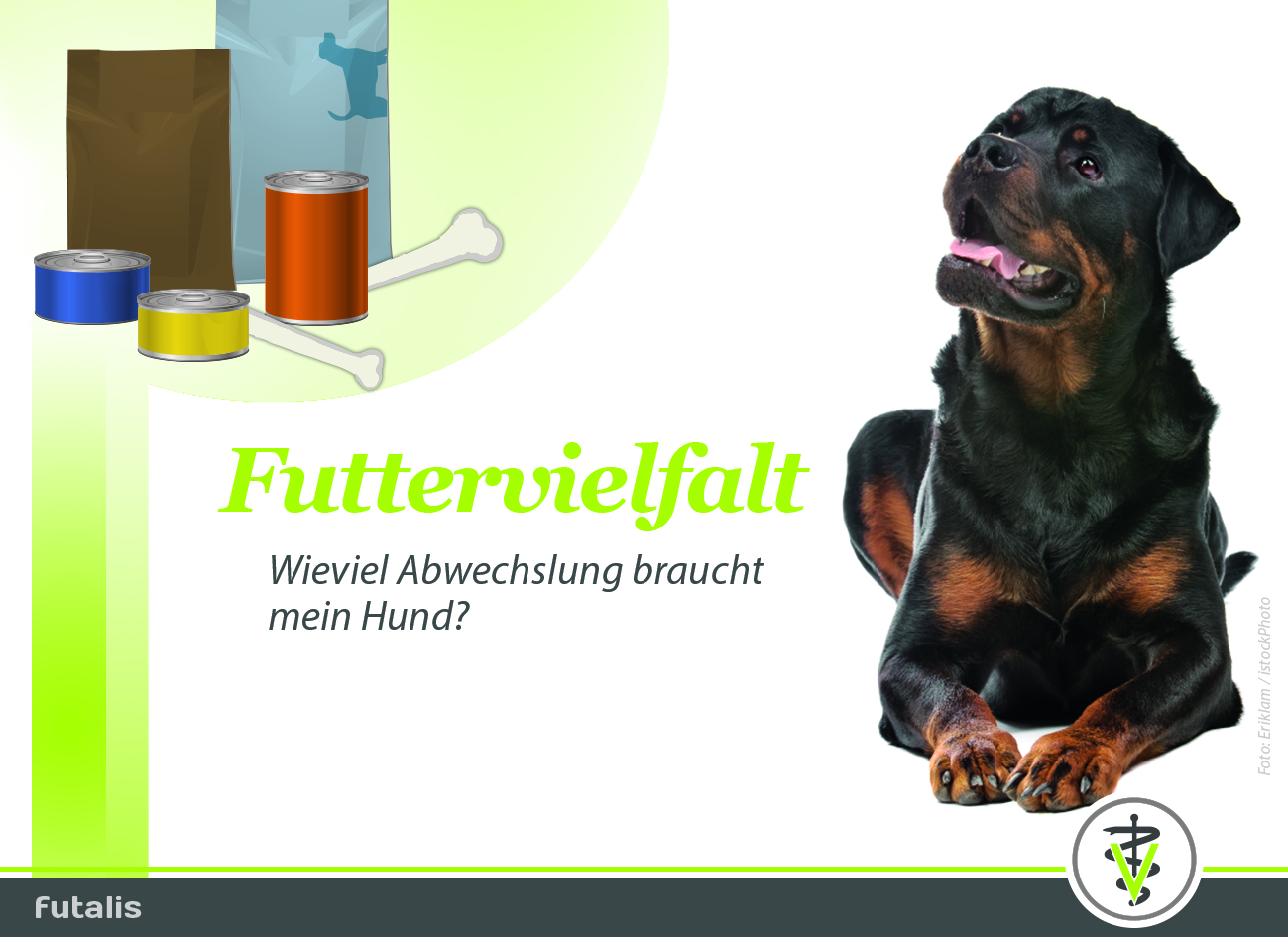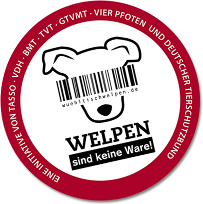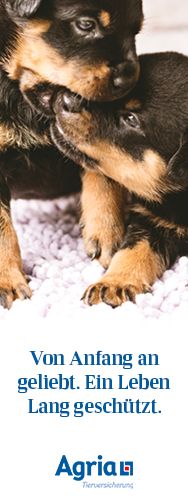| ADRK |
| Allgemeiner Deutscher Rottweiler-Klub e.V. |
Nutrition myth: Dogs need a change in their diet
To feed the same food every day seems too boring to many owners for their dog. They fear deficiency symptoms due to monotonous feeding. This way of thinking probably dates back to the time when not much was known about the exact nutritional requirements of dogs. The only way to ensure that no deficiency symptoms could occur was to have a wide variety of foods in the diet, without knowing exactly how much a dog really needs. Read here how you can feed your dog a balanced diet with the right food.
Changing food types against boredom in the food bowl?
With a balanced feeding, a change of variety or additional feeding is not necessary at all. Self-cooking rations should be calculated in such a way that they cover the nutrient requirements of one day. However, it is not advisable to prepare a food without knowledge of the individual nutrient requirement according to feeling or the availability of raw materials. This can result in mistakes and an increased risk of disease. If a finished feed is fed, normally no deficiency symptoms are to be expected, since most finished feeds are anyway strongly enriched with nutrients and thus rather still the risk of an oversupply exists.
Also a change of taste of the food is not necessary with dogs. A dog, which is fed only with a feed with constant composition, which corresponds to its nutrient need, will not require anything else, if it never experiences the possibility of a change. Only dogs that are underweight or have a significantly increased nutrient requirement may need to switch to a more fatty or tastier diet to avoid weight loss.
Too much variety can even be harmful
Dogs tend to eat more of a new, tasty type of food than their usual food. Only after a certain time does the urge to feed diminish again. If the type of food is changed again and again, this state of greedy eating can also last longer. This increases begging for food on the one hand and the risk of overweight on the other. Puppies are at risk of developmental disorders, such as damage to the joints, if they eat too much of a very tasty food. However, some dogs get so used to the change in their diet that they regularly refuse their old food after a certain time and "force" the owners to change their food. With these dogs it becomes particularly difficult to find a suitable food, if once a disease situation or allergy occurs.
f the composition of the food is frequently changed, digestive disorders can result. The intestinal flora has to adjust to every change in feed. In the case of a change in diet, undesirable intestinal bacteria and microorganisms can temporarily overgrow the good and useful intestinal flora. Diarrhoea, flatulence and malodorous faeces are the unpleasant consequences.
In sensitive dogs a strong variation of the feed can also cause persistent digestive disorders.
In dogs with a tendency to allergies, it is particularly advisable not to change the food components. If allergic symptoms occur, it is difficult to find the causative trigger in the feed if a large number of different components are fed. Also the selection of new raw materials, which the dog tolerates, is made more difficult, since here always a protein source and carbohydrate source must be fallen back, which the dog has never taken to itself and against which therefore probably still no allergy exists.
Also the exact nutrient requirement of each dog should be considered. A food, which consists of many components, should nevertheless cover the individual daily requirement of the individual nutrients. An undersupply, just as an oversupply with certain nutrients can lead to serious health problems, for example joint diseases or urinary stones. Therefore, every self-prepared feed recipe should be based on an exact calculation of the nutrient requirement. Finished food should also always be selected according to the characteristics of the individual dog and correspond to its individual needs.
The correct diet for your dog
There is no standard recipe suitable for all dogs. Every dog is unique and has its own nutritional requirements and individual requirements for its food. The right food composition depends largely on the characteristics of your dog. In particular, the breed, age, weight and degree of activity influence a dog's energy and nutrient requirements, but in addition, special life circumstances such as pregnancy or suckling time of a bitch or the presence of overweight, underweight or disease also play a role. The interaction of these factors results in different requirements for the feed composition for each dog, since the need of each individual nutrient, for example protein, calcium or vitamin A, is to be considered separately from each other. An exact determination of a dog's nutrient requirement is possible by means of a professional ration calculation. This is carried out, for example, by specialised veterinarians. From the individual requirement values, a feed ration can then be created, for example for fresh preparation, which exactly covers the nutrient profile. If it is to be a finished feed, the nutrient supply of the individual animal must also be checked. Both the declared contents of the various nutrients and the amount of feed must be taken into account in order to calculate the supply. Although there are already numerous types of food with different specialisation directions, one should not rely on the fact that the food fits for the own dog, as long as it fulfils only the indicated characteristics. Even with feeds that are already adapted to the breed or age of the dog, the exact nutritional requirements of each individual dog cannot be optimally covered, as all other individual characteristics must also be taken into account. If a ration has been created that fully meets your dog's nutritional needs, then no mistakes in nutrition are to be expected. A variation in the diet is not necessary under these aspects.
Whether fresh or ready-to-serve food, it is also important to include all additional feeds in the daily ration. Also treats, food leftovers from the table or chewing bones, but also hidden gifts from the neighbour must not only be deducted quantitatively from the staple food, but may also require a different composition of the staple food to balance individual nutrient imbalances.
If you do not want to miss out on some variety and variety in your dog's diet, you should decide on certain foods or self-cooking recipes that are balanced in themselves and cover your dog's nutritional needs, and thus can be exchanged against each other. A regular variation within one day is best for the intestinal flora, because a weekly change always has the character of a complete change of food. If the nutrient requirement cannot be completely balanced within one day, for example because a larger amount of a special raw material has been fed once, then a balance should be achieved within at least one week.
As you can see, a dog's diet can sometimes seem like a big mystery. If, however, you follow a few simple basic rules and are not afraid to consult your vet or an animal nutrition counselling centre if you have more in-depth questions, nothing stands in the way of optimal feeding of your dog.










